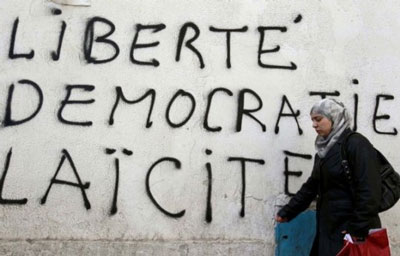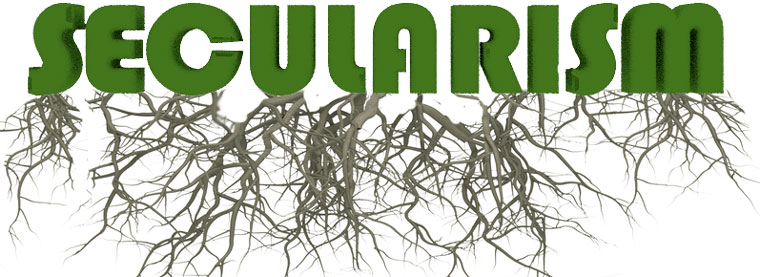Terrorism and Europe’s spiritual vacuum
—Secularism at the root of the problem

Many were stunned by the stories that the media published following the callous murder spree of IS-backed terrorists in Paris on 13 November, 2015.1 However, few people are likely to have read IS’s own statement of responsibility for the attacks and their stated reasons for carrying them out.2 These seem to be ignored by the media. This is likely due, in part, to an understandable unwillingness to aid in the spread of such propaganda. However, I believe there is another reason. It is uncomfortable even to acknowledge the contents of the statement because its description of the increasingly decadent West is rather ‘too close to the bone’. Let it be absolutely clear that, in what follows, I am not suggesting for a moment that the perpetrators of these crimes were justified in their actions. Nevertheless, there is surely a connection between the secularisation of Europe and the increasing jeopardy of the safety of its citizens.
Reading the ISIS justification for terrorist acts against European nations leaves one in no doubt about their stated motives, nor the ideology that, they say, is driving them. The statement begins, “In the Name of Allah … ”, and that name is invoked throughout. Moreover, it states that Paris was chosen “as the capital of prostitution and vice, the lead carrier of the cross in Europe”. In other words, the moral decadence that increasingly characterises European countries, they view as synonymous with these being ‘Christian’, because this is happening in ‘Christian’ countries. The site of the highest death toll, the Bataclan Theatre, was, they say, chosen “where hundreds of pagans gathered for a concert of prostitution and vice.”
The elephant in the room
These days, following events which result in great loss of human life—whether natural disasters, plane crashes, war casualties, or terrorist acts—there is always a media frenzy as every angle of the story is covered in minute detail. This was especially true of the Paris atrocities; yet the reasons given by the perpetrators have been almost completely ignored. A notable exception is an article by Iben Thranholm.3 Having previously worked for Denmark’s equivalent of the BBC,4 this columnist and award-winning Danish journalist threw caution to the wind and spoke her mind.5
For instance, while the media reported that the name of the band playing at the Bataclan Theatre was The Eagles of Death Metal, they chose to ignore the fact that the killing spree happened just at the moment when the band were performing their popular song, Kiss the Devil. That a massacre by religious extremists took place just as people were joining in with the lyrics, “I’ll love the Devil, I’ll sing his song” is, to quote Thranholm, a “diabolical irony”.6 The deaths of so many people, many in the prime of life, is absolutely tragic. However, listening to some political leaders and media pundits you would think that the ‘Jihadists’ (as they are often referred to), are not motivated by their Islamic faith at all. Yet they say they are, and the facts of the matter also suggest this is so. To deny this is simply the crassest political correctness. However, what has any of this got to do with creation apologetics?
The root of the problem

Why is it taboo to mention the connection between such terrorist acts and the religious ideology behind them? Why did the media avoid drawing attention to the satanic shenanigans of the Bataclan rock concert? They desperately want to believe that the ‘war on terror’, which Western nations must fight, has nothing whatever to do with religion! Having worked so hard during recent decades to marginalise biblical Christianity in the public sphere, the last thing they wish to do is concede that this might have come at a price. However, in their hearts, at least some people suspect this to be true. Listen to Darwinist and apostle of atheism, Richard Dawkins:
“There are no Christians, as far as I know, blowing up buildings. I am not aware of any Christian suicide bombers. I am not aware of any major Christian denomination that believes the penalty for apostasy is death. I have mixed feelings about the decline of Christianity, in so far as Christianity might be a bulwark against something worse.”7
Is Christianity a bulwark—a strong defence, a safeguard—against the dangers of an ideology which supports acts of terror? Certainly it is, and for all kinds of reasons which it is not possible to explore in a short article like this. Nevertheless, the following associations can be pointed out as unarguably true, regardless of whether individuals think the changes in society are a good thing or not:
- encroaching secularisation has proceeded hand in hand with the ‘evolutionising’ of the culture;
- there has been a rise in outspoken—even militant—atheism and a growing intolerance of the Bible’s account of Creation, the Fall and the Flood;
- society has increasingly embraced a morality that is in opposition to Christianity, for instance with regard to sexual chastity and homosexual behaviour;
- Christian ethics like the sanctity of human life are constantly being eroded—witness the ongoing issues relating to abortion, embryonic stem cell research and various forms of euthanasia. Much more could be said.
On top of all of this, there is the continuing decline in overall church attendance, which, in the UK at least, would be far more pronounced were it not for the large influx of immigrant people attending places of worship, which serves to mask the fall in numbers.8 As the Bible and God have been jettisoned by more of the populace, a gaping void has been left behind. I can do no better than quote Thranholm here:
“[T]here is little sensibility to religion and spirituality in Europe—and none whatever among the political elite. This is the root of the problem. … The decline of Christianity in the West has created a spiritual and moral vacuum of colossal proportions.”
She goes on to highlight some of the sure signs of this abandonment of Christianity, such as the removal of “all religious symbols from public spaces” on the part of several EU member countries. These are things with which we are becoming increasingly familiar. The ‘root of the problem’, as Thranholm makes clear, is the spiritual and moral vacuum that has resulted from the rejection of Christianity. What some find exasperating about this wilful blindness is that Christianity is the ‘force for good’ for any society and we reap what we sow if we suppress its truth; Peter Hitchens9 has pointed out,
“Only one reliable force stands in the way of the power of the strong over the weak … Only one reliable force restrains the hand of the man of power. And in an age of power-worship, the Christian religion has become the principal obstacle to the desire of earthly utopians for absolute power.”10
All of this should be intuitively true to the Christian since the Bible tells us, “Righteousness exalts a nation, but sin is a reproach to any people” (Proverbs 14:34); a truth which has been illustrated throughout human history, and one which is just as relevant for us today.
Attacking our own foundations?
When people turn away from Christianity, preferring to ‘worship’ at the altars of materialism and secular humanism—godless religions that make no absolute moral or ethical demands—our society loses its moral strength. Much as it angers some people to point it out, the destructive forces of IS currently arrayed against Western democracies should lead to much soul-searching; the situation in which we find ourselves calls for a recognition of the deep malaise in Western culture. We have been attacking our own foundations for far too long. This is certainly relevant to a biblical creation ministry such as CMI. In 2014 we wrote about a Council of Europe resolution11 in which,
They claimed … “It is impossible to reconcile faith and science” and contrasted ideas involving God (which they labelled “absurd”) with evolution, which they asserted to be “the central theory for our understanding of life on earth and for the reassessment of the foundations of our societies” (emphasis added).12
No, the only sure foundation of our Western societies is biblical Christianity. It is this that evolutionary thinking has helped to erode, with increasingly tragic consequences; and it is this which we must work towards restoring. There is a desperate need for us to rediscover our Christian roots and it is to this end that all Christians should be praying for a spiritual revival.
References and notes
- I.S. is Islamic State, though it goes by other names, ISIS, and ISIL. Many within the western media prefer Daesh, presumably to distance the barbarism of this group from the Islamic faith. Return to text
- This can be read here: www.vox.com/2015/11/14/9734794/isis-claim-paris-statement. Return to text
- Iben Thranholm, Europe’s moral and spiritual vacuum invites acts of terrorism, RT.com, 23 November 2015. Return to text
- Called DR, this is rendered in English, Danish Broadcasting Corporation, independent and licence-funded. Return to text
- Indeed, I’m indebted to her article for drawing my attention to the facts of the following paragraph. Return to text
- Photographs of the concert attendees just before the first shots were fired clearly show a number of them making ‘horns of Lucifer’ hand gestures as they were singing along. Return to text
- Ruth Gledhill, Scandal and schism leave Christians praying for a ‘new Reformation’, The Times (UK), 2 April 2010. Return to text
- Anon, Church attendance has been propped up by immigrants, says study, theguardian.com, 3 June 2014. Return to text
- Peter is the older brother of the late Chris Hitchens (a prominent ‘New Atheist’). An English journalist and author, he is a regular columnist for the UK’s The Mail on Sunday. Return to text
- Hitchens, P., The rage against God, Continuum International Publishing Group, London, 2010, p. 83. See also Statham, D., The totalitarian intolerance of the New Atheists, A review of The Rage Against God by Peter Hitchens, J. Creation 5(3):30–32, December 2011; creation.com/intolerance-of-new-atheists. Return to text
- Article 18, Resolution 1580, Council of Europe, 2007. Return to text
- Bell, P., Resisting the secular slide, creation.com/resisting-the-secular-slide, 30 October 2014. Return to text










Readers’ comments
Comments are automatically closed 14 days after publication.